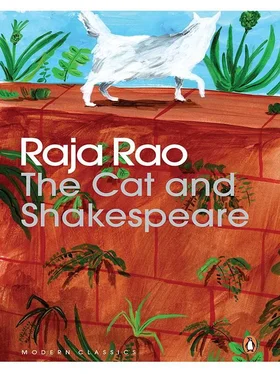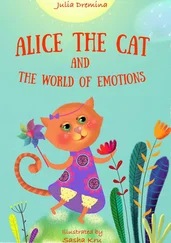Rao Raja - The Cat and Shakespeare
Здесь есть возможность читать онлайн «Rao Raja - The Cat and Shakespeare» весь текст электронной книги совершенно бесплатно (целиком полную версию без сокращений). В некоторых случаях можно слушать аудио, скачать через торрент в формате fb2 и присутствует краткое содержание. Год выпуска: 2014, Издательство: Penguin, Жанр: Современная проза, на английском языке. Описание произведения, (предисловие) а так же отзывы посетителей доступны на портале библиотеки ЛибКат.
- Название:The Cat and Shakespeare
- Автор:
- Издательство:Penguin
- Жанр:
- Год:2014
- ISBN:нет данных
- Рейтинг книги:4 / 5. Голосов: 1
-
Избранное:Добавить в избранное
- Отзывы:
-
Ваша оценка:
- 80
- 1
- 2
- 3
- 4
- 5
The Cat and Shakespeare: краткое содержание, описание и аннотация
Предлагаем к чтению аннотацию, описание, краткое содержание или предисловие (зависит от того, что написал сам автор книги «The Cat and Shakespeare»). Если вы не нашли необходимую информацию о книге — напишите в комментариях, мы постараемся отыскать её.
The Cat and Shakespeare — читать онлайн бесплатно полную книгу (весь текст) целиком
Ниже представлен текст книги, разбитый по страницам. Система сохранения места последней прочитанной страницы, позволяет с удобством читать онлайн бесплатно книгу «The Cat and Shakespeare», без необходимости каждый раз заново искать на чём Вы остановились. Поставьте закладку, и сможете в любой момент перейти на страницу, на которой закончили чтение.
Интервал:
Закладка:
I have hardly formulated this in my slow mind — for as you can see, I am just like that hunter carelessly dropping bilva leaves on some Shiva as yet unknown — when this big creature Govindan Nair leaps across the wall. That he is round and tall makes no difference to his movements. The fact is, to him all the world is just what he does. He does and so the world comes into being. He himself calls it: ‘The kitten is being carried by the cat. We would all be kittens carried by the cat. Some, who are lucky (like your hunter), will one day know it. Others live hearing “meow-meow”. I like being the kitten. And how about you, sir?’ he would say. Then he would spread his fat legs on my bench, open his paws, produce some betel leaf or tobacco (or a cheap cigarette, if that could be found, but this almost never before me, for he knows I hate lighted tobacco), and munching his munch and massaging his limbs, he opens his discourse. ‘I tell you, Ramakrishna Pai, there’s nothing like becoming rich. Our wives adore us if we can produce a car, even a toy car for the baby. Females have one virtue. They adore gilt. My wife is from a grand family. But I am a poor clerk like you. Of course, I did brilliant things when I was young — I was handsome and all that, mothers used to tell me, and I rode a B.S.A. bicycle. I wore grey flannels and went to the College Tennis Club. For I do know of girls. Then some big man thought I was going to be a big man. And thus the wife came into existence. And two children to boot. But the great man became big in fact, and his clerkship remained at forty-five rupees. Fortunately there are wars. And rationing is one of the grandest inventions of man. You stamp paper with figures and you feed stomachs on numbers. I was such, I am such, an original figure. You know there are sadhus, so they say, for I am ignorant of such things, who are supposed to eat three pinches of sand one day, and the mantra 3does the rest. For three months they need no food. I am such a sadhu, dispensing numbers. I give magical cards, and my wife eats pearl rice. My children go to school. My father-in-law lives on his estates and says: “Hey, clerk, what about my daughter?” I laugh. A clerk is a clerk. He could at best rise to the post of superintendent and have two peons at his door. Isn’t that so, dear sir? Ah, the kitten when its neck is held by its mother, does it know anything else but the joy of being held by its mother? You see the elongated thin hairy thing dangling, and you think, poor kid, it must suffer to be so held. But I say the kitten is the safest thing in the world, the kitten held in the mouth of the mother cat. Could one have been born without a mother? Modern inventions do not so much need a father. But a mother — I tell you, without Mother the world is not. So allow her to fondle you and to hold you. I often think how noble it is to see the world, the legs dangling straight, the eyes steady, and the mouth of the mother at the neck. Beautiful.’ Then Govindan Nair would go off on a quiet silence munching his betel leaves. ‘You are an innocent. I tell you God will build you a house of three storeys-note, please, I say three storeys — here, just where you sit. It’s already there. You’ve just to look and see, look deep and see. Let the mother cat hold you by the neck. Suppose I were for a moment to show you the mother cat!’ Govindan Nair never says anything indifferent. For him all gestures, all words have absolute meaning. ‘I meow-meow the dictionary, but my meaning is always one,’ he used to assure me.
‘And so?’
‘And so, sir, let us build a house of three storeys here. I am in the rationing department, and you in the Revenue Board. Figures, magical be figures in wartime. And you build a house, and like in some hospitals where it is writ, Vithaldass Ward, Maruthy Aiyer Ward, I will have a Govindan Nair Ward. My name will thus be writ once in marble. Ah, the mother cat, does one know where she takes us?’
‘Which is to say?’ I venture.
‘Which is to say, your three storeys will go high. Your leaves will have fallen on Shiva. The hunter has to feed his children; the divisional clerk will have to build a house for his august wife. Understood, sir? This is our secret pact,’ said Govindan Nair. He went out to spit, and cried back from the veranda: ‘I say, it’s time for my office’—and jumped across the wall and was gone. What a will-o’-the-wisp of a wall it is, going from nowhere to nowhere; tile-covered, bulging, and obstreperous, it seems like the sound heard and not the word understood. It runs just a little above my window, half an inch higher, and on the other side it dips and rises, running about on its wild, vicarious course. The bilva leaves fall on the wall. And sometimes as if to remind us what a serious tree it is, a bilva fruit drops over the cowshed on the other side, and the thud makes even the cattle rise. The cattle see me, and urinate. The smell of dung and urine of kine is sweet to me. Purity is so near, so concrete. Let us build the house. Lord, let me build the house.
Govindan Nair is a terrible man: huge in his sinews but important in his thought, devious though it is — for it will take you, as some tribespeople do that lead you through jungle and briar, beside the bones of hyena and of panther, and ichor smells of the elephant, and up again through narrow pathways, wind against nostrils, that of a sudden show you his Lord the Tiger might have passed by just now, just a moment ago, look at his paw prints there, and you hear the tiger call while sharp sword-grass is grating your feet; and once up the ledge, standing under a tree, the tribesman will whispering say: ‘There, look, that’s the Pandya Waterfall, Mother Bhavani’s secret trysting place with Lord Shiva,’ and you shudder at the beauty and the silence — such are Govindan Nair’s twists of passage and of thought which take you through fearful twists and trysts and imponderables, to some majesty. Meanwhile he says his mantra (even while he talks), and you hold your breath. Look, look, there Shiva comes down three days before full moon and in Marghashira 4to besport himself with his spouse Bhavani. The river therefore carries flowers, and the young tigress cubs. The mother cat, why, haven’t you seen it — it walks on any garden wall.
Were you certain of the tribesman’s mantra, there’s still terror in your limbs; you never know where you’ll emerge. But were you to land in a ditch, or be transported to another world and to another life, you know that for a moment you’ve beheld Bhavani as she falls into the sheer silence of the valley, and water foams in frolicsome splendour. Happiness is so simple. You just have to know footpaths. I ask you, does the waterfall ever change?
But sometimes sickness may come, and that’s another matter. For that’s what happened to me.
That year, the year 1941, you remember the summer came in early. It was hardly February when the heat began to rise, and people wondered where it was all going to end. The grasses grew corrugated, people were afraid cattle fodder would go dearer. The rice fields were getting baked up. For four months we had no rains. People said of course it’s the wars; what is there to be done? You cannot commit such crimes and expect the rains to fall as usual. Man must pay for his sins in slow death. There must be some balance in heaven. When opposites are equalled that is peace. If you kill you get killed, that is the law of nature. Hitler and the British brought about the drought.
Many persons in Trivandrum fell ill with this or that disease. Our Revenue Board Third Member, Kunni Kutta Nair, fell with a thud into his courtyard, and blood came out of his nose. It was diagnosed as one thing, and he died of another. People also died of cholera. Some had, like me, strange boils. It started one morning as I began to scratch my feet. The red of my scratch began to swell up. It became round and then yellow. With difficulty I took my bath and limped to the office. From Puttenchantai, as you know, to the Secretariat is just about twelve minutes’ walk. It took me twenty-five but the bubo grew and grew. When my boss suddenly came in around eleven-thirty, asking for some file, I jumped up, and the bubo burst under my feet. The fluid just spilled over the floor. I gave my boss the file and went into the bathroom (on the way I asked Krishna, the peon, to call the sweeper woman and have the floor cleaned). Once in the bathroom, I found another red spot rising on my thigh. This time there was no question. It almost grew big under my eyes. It was like a guava in a few minutes. But because it gave me no pain, I just went back to my table. In a few hours my whole body except my face had nothing but boils. They rose, grew red and then yellow, añd burst like country eggs. I went to the chemists’ and they gave me an ointment and bandages. I walked home with four bandages. I could not touch anything except coffee, I had such disgust. What’s the use of having a wife if she cannot take care of one — for when boils come, do they say, Dear Sir, I am coming, may I come, like a mother-in-law? No, they come just like that, and occupy your house. They’re of British make, and like everything British, it works without your knowing. Govindan Nair has a simple definition: ‘Britain has no secret service — Britain is secret service. Hitler has bombs; the British have boils. But of the two, which one works, dear sir, great sir? Of course the boils.’
Читать дальшеИнтервал:
Закладка:
Похожие книги на «The Cat and Shakespeare»
Представляем Вашему вниманию похожие книги на «The Cat and Shakespeare» списком для выбора. Мы отобрали схожую по названию и смыслу литературу в надежде предоставить читателям больше вариантов отыскать новые, интересные, ещё непрочитанные произведения.
Обсуждение, отзывы о книге «The Cat and Shakespeare» и просто собственные мнения читателей. Оставьте ваши комментарии, напишите, что Вы думаете о произведении, его смысле или главных героях. Укажите что конкретно понравилось, а что нет, и почему Вы так считаете.












